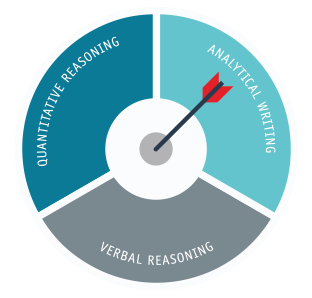
About GRE
Wisdom Mart is known for its thorough research and professionalism in the field of Education abroad.
Program Highlights

- Intensive course covering all GRE areas
- 3-4 classes per week
- Flexible scheduling of classes/special weekend batches
- Complementary set of text books
- Analysis of Reading aptitude with RC spectrum
- Exclusive strategies for tackling CR questions
- Voluminous assignments helpful in Analogies, Antonyms and Sentence Completion
- Emphasis on Vocabulary building
- Specialised sessions for Data Interpretation and Quantitative Comparison
- Evaluation through mock test
- Doubt clearing sessions throughout the course
Test Structure

The GRE test has three parts - Quantitative, Verbal and Analytical Writing Assessment. The test is scored on a maximum of 340. The following is the GRE test structure:
Verbal section
The verbal section mainly has 3 Types of questions such as text completion, reading comprehension passages and sentence equivalence. Multiple-choice response sections are graded on a scale of 130-170, in 1-point increment. This section primarily tests vocabulary, and average scores in this section are substantially lower than those in the quantitative section. In a typical examination, there are 2 sections, 20 Questions in each and 30 minutes are allotted for each section.
Quantitative section
The quantitative section, the other multiple-choice section, consists of problem solving and quantitative comparison questions that test high-school level mathematics. Multiple-choice response sections are graded on a scale of 130-170, in 1-point increment. In a typical examination, there are 2 sections consisting of 20 Questions per section and 35 minutes are allotted for each of them.
Analytical writing section
The Analytical Writing measure tests your critical thinking and analytical writing skills It consists of two different essays, an "issue task" and an "argument task". The writing section is graded on a scale of 0-6, in half-point increments. The essays are written on a computer using a word processing program specifically designed by ETS. The program allows only basic computer functions and does not contain a spell-checker or other advanced features. Each essay is scored by at least two readers on a six-point holistic scale. If the two scores are within one point, the average of the scores is taken. If the two scores differ by more than a point, a third reader examines the response.
Issue task
The test taker will be able to choose between two topics upon which to write an essay. The time allowed for this essay is 30 minutes. Issue topics are selected from a pool of questions.
Argument task
The test taker will be given an "argument" and will be asked to write an essay that critiques the argument. Test takers are asked to consider the argument's logic and to make suggestions about how to improve the logic of the argument. The time allotted for this essay is 30 minutes. Arguments are selected from a pool of topics.
** An unidentified unscored section may be included and may appear in any order after the Analytical Writing section. It is not counted as part of your score. *** An identified research section that is not scored may be included, and it is always at the end of the test.
| Measure | Number of Questions | Allotted Time |
|---|---|---|
| Analytical Writing (One section) | One "Analyze an Issue" task | 30 minutes |
| Verbal Reasoning (Two sections) |
Section 1: 12 questions Section 2: 15 questions |
Section 1: 18 minutes Section 2: 23 minutes |
| Quantitative Reasoning (Two sections) |
Section 1: 12 questions Section 2: 15 questions |
Section 1: 21 minutes Section 2: 26 minutes |
Test Location

Computer-based GRE General Test
The GRE test is administered world wide through the GRE test center recognized by the ETS. GRE Testing centers are available in almost every place in the world. The candidate aspiring to Take GRE can contact the appropriate GRE testing center register for GRE Test and take GRE Test in the appropriate GRE Test center of his choice.
These test location lists, which are updated continually, contain the computer-based testing centers currently available.
- Test center list — U.S., U.S. Territories, Puerto Rico, Canada
- Test center list and RRC list — International
Appointments are scheduled on a first-come, first-served basis.
Register for GRE

The GRE General Test is offered as a computer-based test in the United States, Canada and many other countries. Register for a computer-based test.
Paper-based GRE General Test administrations are offered in areas of the world where computer-based testing is not available.
There is a split-test administration offered in China (including Hong Kong), Korea and Taiwan.
Important Things to Remember When Registering for the GRE General Test
- Take the test as soon as possible so your scores will be received in time to be considered with your application.
- Check the GRE online registration system for the most up-to-date test center information.
- Not all test centers are open on all dates.
- Test centers fill up quickly, so early registration is recommended to get your preferred test locations and date selection.
- When registering, be sure that the spelling of your name exactly matches the name printed on the identification documents(s) you will present at the test center. If this information does not match, you will not be permitted to test and your test fee will be forfeited. There are no exceptions. See Identification Requirements.
- You are not allowed to transfer your registration to someone else.
- Your test fee entitles you to request that scores be sent to as many as four graduate institutions or fellowship sponsors. You will be asked to designate your score recipients either when registering for the test or at the test center on test day.
- Late registration for the paper-based General Test is available if you register online. Late registration closes one week after the regular registration date. The fee for late registration is $25.
- You will be given the option to register for the free GRE Search Service on the day of your computer-based GRE General Test or when you register for the paper-based GRE General Test. You can also sign up separately at any time. The GRE Search Service matches prospective graduate students with participating graduate schools and fellowship sponsors. For more information, see GRE Search Service.
- You now have access to a new service, the ETS Personal Potential Index (ETS PPI). Introduced in July 2009, ETS PPI is a first of its kind web-based evaluation system that enables you to provide information from multiple evaluators to institutions about six personal attributes that are critical for success in graduate and professional school: knowledge and creativity, communication skills, teamwork, resilience, planning and organization, and ethics and integrity. As part of your GRE General Test fee, you will be able to send up to four ETS PPI evaluation reports. To learn more about how you can use ETS PPI to showcase your potential, visit the ETS PPI website.
Repeating the General Test
It may be to your advantage to take the GRE General Test more than once if you think that the scores you obtained do not reflect your true abilities. If your scores seem unusually low in comparison with other indicators of your preparedness for graduate studies, you may want to consider taking the test again. Those considering repeating a test should be aware that large score increases are unusual, and for some test takers scores will go down. Keep in mind that score reports will include test results obtained within the past five-year period.
You may take the General Test (computer-based and/or paper-based) only once per calendar month and no more than five times within any 12-month period. This applies even if you canceled your scores on a test taken previously.
